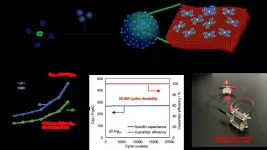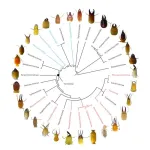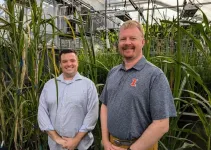(Press-News.org) Honesty is the best policy… most of the time. Social norms help humans understand when we need to tell the truth and when we shouldn’t, to spare someone’s feelings or avoid harm. But how do these norms apply to robots, which are increasingly working with humans? To understand whether humans can accept robots telling lies, scientists asked almost 500 participants to rate and justify different types of robot deception.
“I wanted to explore an understudied facet of robot ethics, to contribute to our understanding of mistrust towards emerging technologies and their developers,” said Andres Rosero, PhD candidate at George Mason University and lead author of the article in Frontiers in Robotics and AI. “With the advent of generative AI, I felt it was important to begin examining possible cases in which anthropomorphic design and behavior sets could be utilized to manipulate users.”
Three kinds of lie
The scientists selected three scenarios which reflected situations where robots already work — medical, cleaning, and retail work — and three different deception behaviors. These were external state deceptions, which lie about the world beyond the robot, hidden state deceptions, where a robot’s design hides its capabilities, and superficial state deceptions, where a robot’s design overstates its capabilities.
In the external state deception scenario, a robot working as a caretaker for a woman with Alzheimer’s lies that her late husband will be home soon. In the hidden state deception scenario, a woman visits a house where a robot housekeeper is cleaning, unaware that the robot is also filming. Finally, in the superficial state deception scenario, a robot working in a shop as part of a study on human-robot relations untruthfully complains of feeling pain while moving furniture, causing a human to ask someone else to take the robot’s place.
What a tangled web we weave
The scientists recruited 498 participants and asked them to read one of the scenarios and then answer a questionnaire. This asked participants whether they approved of the robot’s behavior, how deceptive it was, if it could be justified, and if anyone else was responsible for the deception. These responses were coded by the researchers to identify common themes and analyzed.
The participants disapproved most of the hidden state deception, the housecleaning robot with the undisclosed camera, which they considered the most deceptive. While they considered the external state deception and the superficial state deception to be moderately deceptive, they disapproved more of superficial state deception, where a robot pretended it felt pain. This may have been perceived as manipulative.
Participants approved most of the external state deception, where the robot lied to a patient. They justified the robot’s behavior by saying that it protected the patient from unnecessary pain — prioritizing the norm of sparing someone’s feelings over honesty.
The ghost in the machine
Although participants were able to present justifications for all three deceptions — for instance, some people suggested the housecleaning robot might film for security reasons — most participants declared that the hidden state deception could not be justified. Similarly, about half the participants responding to the superficial state deception said it was unjustifiable. Participants tended to blame these unacceptable deceptions, especially hidden state deceptions, on robot developers or owners.
“I think we should be concerned about any technology that is capable of withholding the true nature of its capabilities, because it could lead to users being manipulated by that technology in ways the user (and perhaps the developer) never intended,” said Rosero. “We’ve already seen examples of companies using web design principles and artificial intelligence chatbots in ways that are designed to manipulate users towards a certain action. We need regulation to protect ourselves from these harmful deceptions.”
However, the scientists cautioned that this research needs to be extended to experiments which could model real-life reactions better — for example, videos or short roleplays.
“The benefit of using a cross-sectional study with vignettes is that we can obtain a large number of participant attitudes and perceptions in a cost-controlled manner,” explained Rosero. “Vignette studies provide baseline findings that can be corroborated or disputed through further experimentation. Experiments with in-person or simulated human-robot interactions are likely to provide greater insight into how humans actually perceive these robot deception behaviors.”
END
Will humans accept robots that can lie? Scientists find it depends on the lie
Scientists find that a lie that protects someone’s feelings is acceptable, but lies which misrepresent a robot’s abilities aren’t
2024-09-05
ELSE PRESS RELEASES FROM THIS DATE:
Achieving a supercapacitor through the 'molecular coating' approach
2024-09-05
Researchers at Tohoku University have successfully increased the capacity, lifetime durability, and cost-effectiveness of a capacitor in their pursuit of a more power-efficient future. A capacitor is a device used as part of a circuit that can store and release energy, just like a battery. What makes a capacitor different from a battery is that it takes much less time to charge. For example, your cellphone battery will power your phone instantly, but charging that battery back up to 100% when it dies is far from instantaneous.
While this makes capacitors sound like the superior choice, they have some big drawbacks that need to be overcome. Firstly, their capacity is much smaller ...
Novel biomarker could lead to early diagnosis of Alzheimer’s disease, pilot study suggests
2024-09-05
New research has discovered a unique and promising avenue for diagnosing Alzheimer’s disease (AD) earlier – by analysing AD biomarkers in blood – so that the impacts of dementia can be reduced.
AD is the most common form of dementia, estimated to contribute to 60-70 per cent of cases, or more than 33 million cases worldwide, according to the World Health Organisation. Currently incurable, AD is usually diagnosed when a person is having significant difficulties with memory and thinking that impact their daily life.
University of Melbourne researcher Dr Brandon Mahan leads a group of analytical geochemists from the Faculty ...
WEHI bioinformatician wins prestigious Eureka prize
2024-09-05
WEHI’s Bioinformatics division head, Professor Gordon Smyth, has won the 2024 Eureka Prize for Excellence in Research Software.
The award recognises Prof Smyth’s lead role in developing and designing the limma software package, which helps researchers detect changes in gene activity.
limma has helped researchers around the world detect changes in gene activity – a crucial element to finding new treatments for a range of diseases, like cancer – and has been used or cited in more than 70,000 published papers worldwide.
The Australian Museum Eureka Prizes are ...
The dictionary of termites has been rewritten
2024-09-05
Termites have a bad reputation. Most think of them as pests, a status that isn’t helped by their recent reclassification into the cockroach family.
But not only do the termites that cause serious problems for humans only make up 3.5% of all termite species, termites also serve as crucial ecosystem engineers, maintaining the infrastructure of various environments. Like earthworms, they circulate nutrients by decomposing plant materials, and they play the important role of bioturbators: much like plowing a field, termites aerate the soil, expose underground nutrients, and let water infiltrate deeper layers of soil – ...
CABBI team designs efficient bioenergy crops that need less water to grow
2024-09-05
Drought stress has long been a limiting factor for crop production around the world, a challenge exacerbated by climate change.
For more than a century, scientists have targeted a key plant trait known as water use efficiency (WUE) to help crops grow with less water and avoid suffering from drought stress. Greater WUE can help plants avoid drought stress — but for most crops it’s also associated with lower productivity when water is plentiful.
In a pair of new studies published in the Journal of Experimental Botany, ...
Texas A&M researchers discover that sustained neck exertions change the spine and muscles, causing pain
2024-09-05
Learning new languages, sending emails, attending a virtual class, or speaking to loved ones halfway around the world are just some of the tasks accomplished by touching a button on a smartphone. Unfortunately, the ease and convenience of modern devices have also come with a painful crick in the neck. The sedentary nature of work and prolonged use of hand-held devices and computers have contributed to a sharp increase in neck pain.
While fatigue in neck muscles has long been suspected of causing pain, the actual mechanical changes in the spine and muscles that precede weakness remain an outstanding question.
Now, using high-precision X-ray ...
Air pollution linked to higher risk of infertility in men
2024-09-05
Long term exposure to fine particulate matter (PM2.5) air pollution is linked to a higher risk of infertility in men, whereas road traffic noise is linked to a higher risk of infertility in women over 35, finds a Danish study published by The BMJ today.
If these findings are confirmed in future studies, they could help guide strategies to regulate noise and air pollution to protect the general population from these exposures, say the researchers.
Infertility is a major global health problem affecting one in seven couples trying to conceive.
Several ...
Prostate cancer rates across Europe since 1980 “indicative of overdiagnosis” say experts
2024-09-05
Rates of prostate cancer across Europe since 1980 are “indicative of overdiagnosis”, say researchers in a study published by The BMJ today.
Overdiagnosis refers to the detection of harmless cancers that are unlikely to cause symptoms or death during a patient’s lifetime, which can lead to unnecessary treatment, negative impacts on quality of life, and wasted healthcare resources.
The findings show rapid increases in the number of new cases (incidence) in parallel with uptake of so far predominantly opportunistic ...
Children switch to walking and cycling to school after introduction of London’s Ultra-Low Emission Zone
2024-09-05
Four in ten children in Central London who travelled to school by car switched to more active modes of transport, such as walking, cycling, or public transport, following the introduction of the Ultra-Low Emission Zone (ULEZ), according to new research. In the comparison area with no ULEZ, Luton, only two in ten children made this switch over the same period.
Car travel contributes to air pollution, a major cause of heart and lung diseases including asthma attacks. Beyond this, it limits children's opportunities for physical activity, hindering their development and mental health, and increasing their risk of obesity and chronic illnesses.
Despite ...
Three top ways to stop smoking
2024-09-05
A major new scientific review of evidence published in the journal Addiction has identified three top strategies for quitting smoking:
Varenicline -- a prescription drug sold under the brand names Chantix and Champix among others.
Cytisine -- a plant-based compound available under prescription in the United Kingdom, in Canada as an over-the-counter natural health product (Cravv®) and throughout central and eastern Europe.
Nicotine e-cigarettes.
These work best when combined with behavioural support, ...
LAST 30 PRESS RELEASES:
New knowledge on heritability paves the way for better treatment of people with chronic inflammatory bowel disease
Under the Lens: Microbiologists Nicola Holden and Gil Domingue weigh in on the raw milk debate
Science reveals why you can’t resist a snack – even when you’re full
Kidney cancer study finds belzutifan plus pembrolizumab post-surgery helps patients at high risk for relapse stay cancer-free longer
Alkali cation effects in electrochemical carbon dioxide reduction
Test platforms for charging wireless cars now fit on a bench
$3 million NIH grant funds national study of Medicare Advantage’s benefit expansion into social supports
Amplified Sciences achieves CAP accreditation for cutting-edge diagnostic lab
Fred Hutch announces 12 recipients of the annual Harold M. Weintraub Graduate Student Award
Native forest litter helps rebuild soil life in post-mining landscapes
Mountain soils in arid regions may emit more greenhouse gas as climate shifts, new study finds
Pairing biochar with other soil amendments could unlock stronger gains in soil health
Why do we get a skip in our step when we’re happy? Thank dopamine
UC Irvine scientists uncover cellular mechanism behind muscle repair
Platform to map living brain noninvasively takes next big step
Stress-testing the Cascadia Subduction Zone reveals variability that could impact how earthquakes spread
We may be underestimating the true carbon cost of northern wildfires
Blood test predicts which bladder cancer patients may safely skip surgery
Kennesaw State's Vijay Anand honored as National Academy of Inventors Senior Member
Recovery from whaling reveals the role of age in Humpback reproduction
Can the canny tick help prevent disease like MS and cancer?
Newcomer children show lower rates of emergency department use for non‑urgent conditions, study finds
Cognitive and neuropsychiatric function in former American football players
From trash to climate tech: rubber gloves find new life as carbon capturers materials
A step towards needed treatments for hantaviruses in new molecular map
Boys are more motivated, while girls are more compassionate?
Study identifies opposing roles for IL6 and IL6R in long-term mortality
AI accurately spots medical disorder from privacy-conscious hand images
Transient Pauli blocking for broadband ultrafast optical switching
Political polarization can spur CO2 emissions, stymie climate action
[Press-News.org] Will humans accept robots that can lie? Scientists find it depends on the lieScientists find that a lie that protects someone’s feelings is acceptable, but lies which misrepresent a robot’s abilities aren’t




